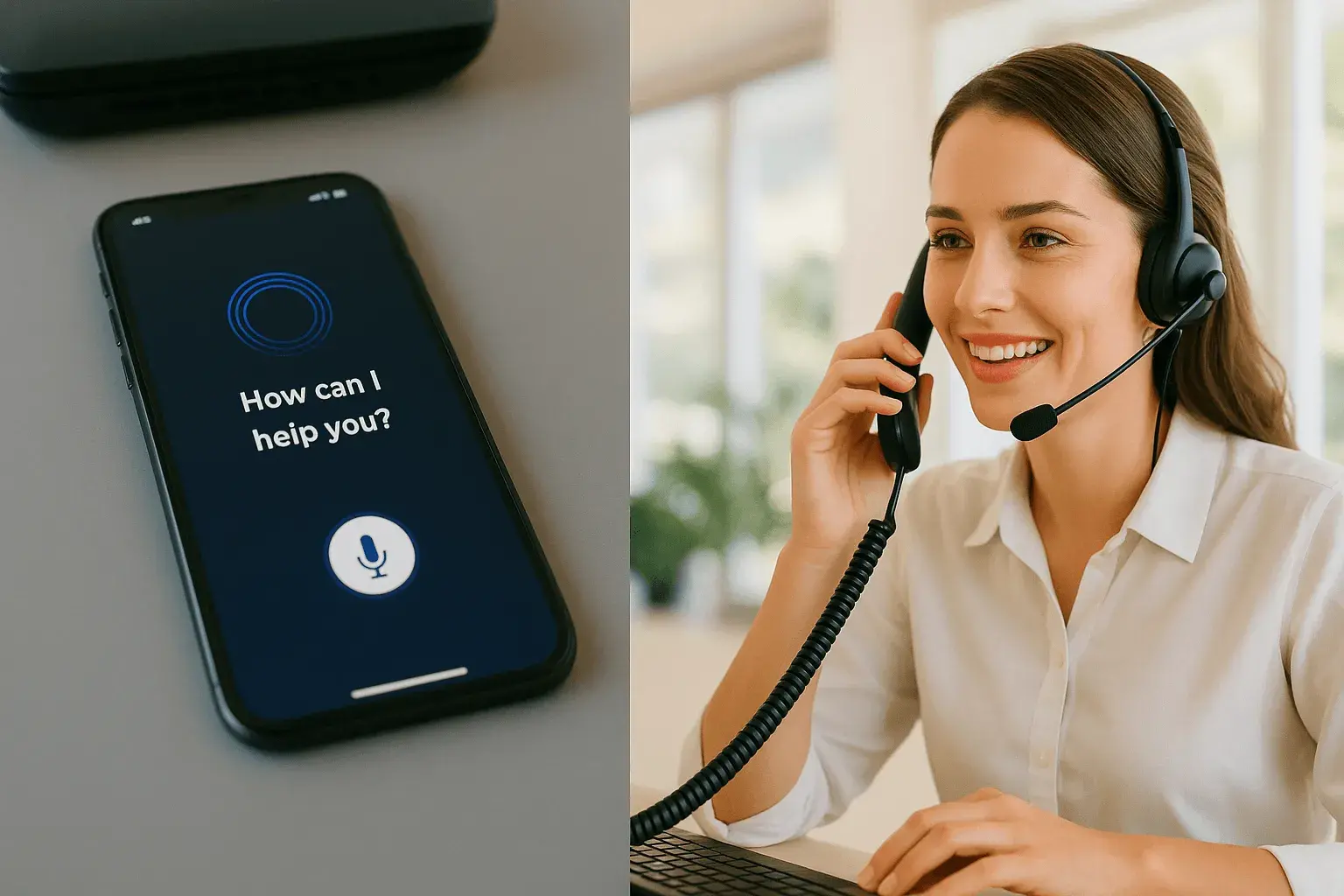
AI Phone Answering vs. Real (Human) Answering Services
Comparing AI phone services and traditional answering services
Sophiie Bankeher
Aug 14, 2025

Table of contents
In today’s fast-paced market, how you answer your phone can make or break the customer experience. Comparing AI phone answering to traditional human services helps highlight where each excels and where combining both can deliver standout service. Let’s break it down.
1. 24/7 Availability vs. Limited Hours
First impressions matter—especially when someone picks up the phone. The availability of your answering service impacts your ability to capture leads and resolve inquiries efficiently.
AI phone answering is always on. Calls get answered within seconds, even outside business hours. Yes, human receptionists do provide a warmer, more personalised interaction but this is mostly on during working hours. After-hours calls often go to voicemail, risking lost opportunity.
Studies show that 85% of callers don’t try again if their first call goes unanswered—so missing calls means missing customers.
2. Cost & Scalability
Budgets can vary widely—from startups to established offices. Let’s compare costs and growth potential:
AI phone answering brings dramatic savings. Comparable systems in Australia can cost as little as 13 cents per minute—far less than hiring a full-time receptionist, which costs around A$57,500 per year
AI scales easily—during busy periods, it can handle surges in call volume without impacting service quality while human receptionists can be expensive to scale. Hiring, training, and managing extra staff quickly adds up. Plus, availability may still fall short during peak demand.
3. Speed, Consistency & Accuracy
Customers value fast responses and reliable information. Let’s look at what each option brings to the table:
While a traditional human receptionist offers the warmth of personal interaction and can adapt intuitively to nuanced situations, an AI receptionist delivers unmatched speed, consistency, and availability.
Unlike human staff, AI can also handle multiple calls or messages simultaneously without fatigue, operate 24/7 without breaks, and instantly recall detailed customer information. This means no missed calls, faster response times, and greater cost efficiency for businesses. However, human receptionists still excel in empathy-driven conversations and complex problem-solving, so the ideal approach for many companies is to blend AI efficiency with human judgment where it matters most.
4. Integration & Workflow Automation
Operational efficiency means more than answering calls. The ability to integrate with your systems makes AI a standout.
AI phone answering integrates easily with scheduling tools, CRMs, and email systems—automating reminders, updates, and data entry. On the other hand, human services generally rely on manual processes across multiple systems. While versatile, they can be slower and more prone to some errors or delays.
5. Customer Experience & Trust
The human touch creates connection, while AI provides efficiency—but can they coexist?
Human answering services shine in situations where empathy, trust-building, and the ability to navigate complex emotions are essential, making them invaluable for high-touch client relationships.
AI phone answering, on the other hand, delivers unmatched speed, consistency, and reliability for routine interactions, and its non-judgmental, always-available nature can even be preferred by some callers. For many businesses, the most effective solution is a hybrid model—allowing AI to manage routine and repetitive calls efficiently, while human staff focus on emotionally delicate or highly personalised conversations. This balance ensures both operational efficiency and the human warmth that fosters long-term loyalty.
Why AI Phone Answering Matters for Your Business
Every missed call is a missed opportunity - whether it’s a potential customer, a returning client, or an important supplier, unanswered calls can lead to lost sales, diminished trust, and weaker relationships. An AI-powered phone answering system ensures you never let valuable interactions slip through the cracks.
AI phone answering also helps you save on costs while scaling smartly. Instead of hiring additional staff for peak times or 24/7 coverage, AI can handle large volumes of calls at a fraction of the cost—freeing your human team to focus on higher-value tasks without sacrificing responsiveness.
With AI, you can deliver consistent, accurate service no matter the time, call volume, or staff changes. The system provides uniform greetings, correct information, and reliable follow-through, ensuring customers always receive the same high-quality experience.
Additionally, AI phone answering enables 24/7 availability. Customers can get assistance, book appointments, or leave messages at any time of day, accommodating different time zones and urgent inquiries without the need for overnight staffing.
Finally, it gives you valuable insights from call analytics. By tracking common inquiries, call patterns, and customer sentiment, AI can highlight opportunities to improve products, services, or customer support strategies—helping your business make more informed decisions.
Conclusion
In the debate between AI phone answering and human answering services, there’s no one-size-fits-all winner—it comes down to your business goals, call volume, and customer expectations. AI brings unmatched speed, cost efficiency, and round-the-clock availability, while human receptionists excel in empathy, personalisation, and complex problem-solving.
For many Australian businesses, the smartest choice isn’t picking one over the other, but blending both. By letting AI handle routine, high-volume inquiries and freeing human staff to focus on sensitive or high-value calls, you create a service experience that is both efficient and deeply personal. In a market where every call matters, this hybrid approach ensures you never miss an opportunity to connect, impress, and grow.

AI for Tradies: How Trade Businesses Are Changing in 2026
The trade industry is changing fast. From AI receptionists to smarter scheduling, discover how tradies are using AI in 2026 to work faster, win more jobs, and stay ahead.

Building Inspection Is Getting Heavier — How AI Helps Australian Inspectors
Building inspectors in Australia are facing heavier workloads, more client expectations, and complex admin tasks. Here’s how AI tools like smart scheduling, automated communication, and job management help streamline operations and boost efficiency.